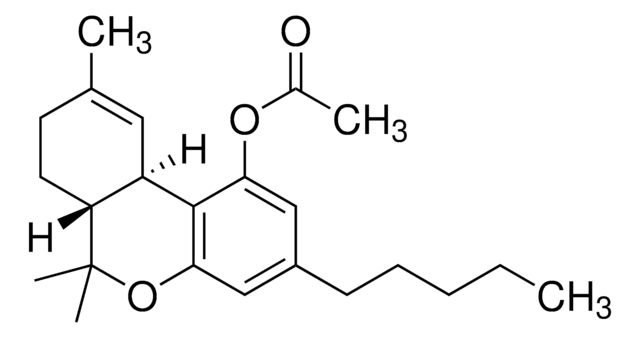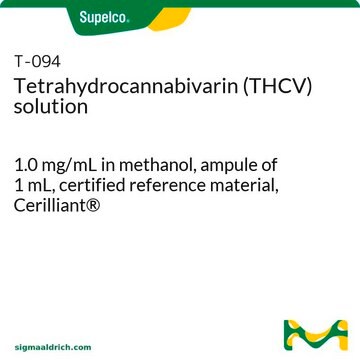39382
Delta9-Tetrahydrocannabinolic acid A
analytical standard
Sinonimo/i:
THCA-A
About This Item
Prodotti consigliati
Grado
analytical standard
Livello qualitativo
Saggio
≥97% (HPLC)
Durata
limited shelf life, expiry date on the label
Controllo stupefacenti
USDEA Schedule I; Home Office Schedule 1; regulated under CDSA - not available from Sigma-Aldrich Canada
tecniche
HPLC: suitable
gas chromatography (GC): suitable
solid phase extraction (SPE): suitable
Compatibilità
corresponds for H-NMR
applicazioni
forensics and toxicology
pharmaceutical (small molecule)
veterinary
Formato
neat
Temperatura di conservazione
−20°C
Stringa SMILE
CCCCCc1cc2OC(C)(C)C3CCC(C)=CC3c2c(O)c1C(O)=O
InChI
1S/C22H30O4/c1-5-6-7-8-14-12-17-19(20(23)18(14)21(24)25)15-11-13(2)9-10-16(15)22(3,4)26-17/h11-12,15-16,23H,5-10H2,1-4H3,(H,24,25)/t15-,16-/m1/s1
UCONUSSAWGCZMV-HZPDHXFCSA-N
Applicazioni
Codice della classe di stoccaggio
11 - Combustible Solids
Classe di pericolosità dell'acqua (WGK)
WGK 3
Punto d’infiammabilità (°F)
Not applicable
Punto d’infiammabilità (°C)
Not applicable
Dispositivi di protezione individuale
Eyeshields, Gloves, type N95 (US)
Scegli una delle versioni più recenti:
Possiedi già questo prodotto?
I documenti relativi ai prodotti acquistati recentemente sono disponibili nell’Archivio dei documenti.
I clienti hanno visto anche
Il team dei nostri ricercatori vanta grande esperienza in tutte le aree della ricerca quali Life Science, scienza dei materiali, sintesi chimica, cromatografia, discipline analitiche, ecc..
Contatta l'Assistenza Tecnica.








